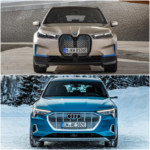It’s that time of the year for BloombergNEF’s battery price survey, and we have some good news to share. While in 2010 the average lithium-ion battery pack prices automakers had to pay exceeded $1,100 / kWh, costs have come down dramatically in the decade that has passed. To be more precise, they’ve plummeted by 89% to $137 per kWh.
According to the analysis, the price is projected to come down furthermore in the following years, dropping to as low as $101 / kWh by 2023, based on BloombergNEF’s forecast. That is widely regarded as being the tipping point, with prices of EVs estimated to match those of traditional vehicles powered by internal combustion engines.
With the cost of a battery used by an EV representing a significant chunk of the vehicle’s final price tag, BNEF’s 2020 Battery Price Survey gives us hope it won’t be long before customers won’t have to pay a premium when shopping for an EV. As a matter of fact, the study shows battery pack prices have already dipped below $100 for electric buses in China, although the average cost of an e-bus’ battery pack in the People’s Republic stands at $105 / kWh.
BNEF’s 2020 Battery Price Survey predicts 2023 will indeed be the year when car companies should be able to manufacture and sell fully electric vehicles at prices equal to those similarly sized ICE-powered cars and with the same profit margins. If in a couple of years there will still be tax credits in some parts of the world, there’s a good chance an EV will be cheaper than a gasoline or diesel car.
How did the battery costs go down so much in only 10 years? More and more automakers are ordering battery packs to meet increasing demand from customers. Other factors that have contributed to the price decrease include the improved battery pack designs as well as lower prices of cathode materials. That makes perfect sense as costs generally go down the more you make something.
BNEF’s 2020 Battery Price Survey goes as far as to estimate a reduction of the battery cost to just $58 / kWh by 2030, especially if solid-state batteries make it to the market in the years to come. Cells for solid-state batteries could be produced at only 40% of the manufacturing costs necessary for conventional lithium-ion batteries. As it stands, the battery pack alone represents approximately 21% of an EV’s cost, according to the same analysis.



